Lesson 7 复合不定代词、连词和频度副词 人教版英语暑假语法专题教案(七升八)
- 格式:docx
- 大小:31.14 KB
- 文档页数:9
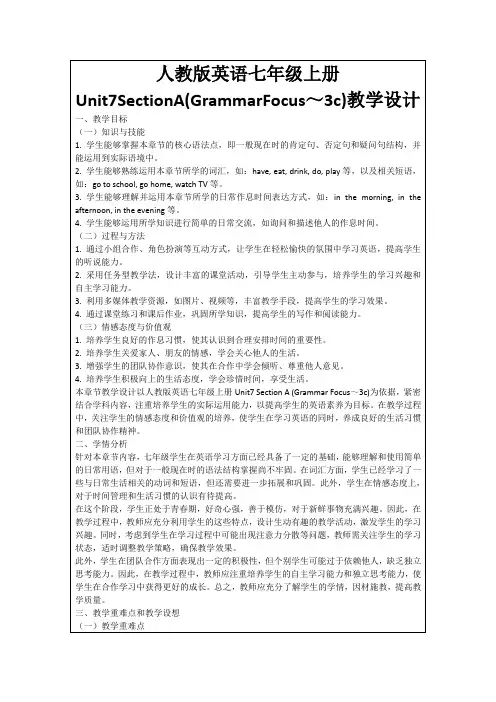
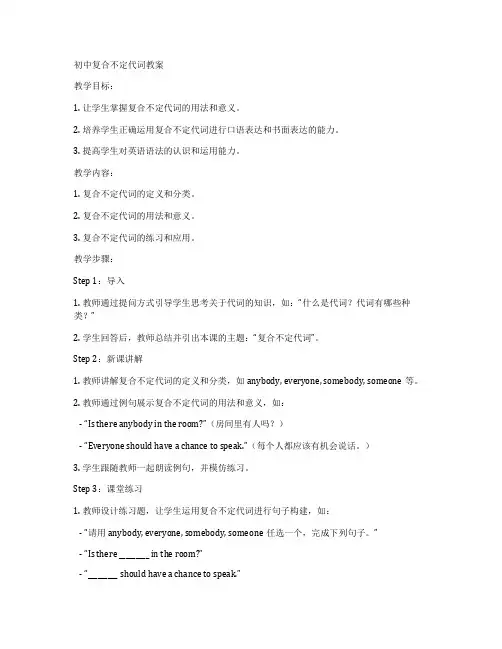
初中复合不定代词教案教学目标:1. 让学生掌握复合不定代词的用法和意义。
2. 培养学生正确运用复合不定代词进行口语表达和书面表达的能力。
3. 提高学生对英语语法的认识和运用能力。
教学内容:1. 复合不定代词的定义和分类。
2. 复合不定代词的用法和意义。
3. 复合不定代词的练习和应用。
教学步骤:Step 1:导入1. 教师通过提问方式引导学生思考关于代词的知识,如:“什么是代词?代词有哪些种类?”2. 学生回答后,教师总结并引出本课的主题:“复合不定代词”。
Step 2:新课讲解1. 教师讲解复合不定代词的定义和分类,如anybody, everyone, somebody, someone等。
2. 教师通过例句展示复合不定代词的用法和意义,如:- “Is there anybody in the room?”(房间里有人吗?)- “Everyone should have a chance to speak.”(每个人都应该有机会说话。
)3. 学生跟随教师一起朗读例句,并模仿练习。
Step 3:课堂练习1. 教师设计练习题,让学生运用复合不定代词进行句子构建,如:- “请用anybody, everyone, somebody, someone任选一个,完成下列句子。
”- “Is there _________ in the room?”- “_________ should have a chance to speak.”2. 学生独立完成练习题,教师巡回指导。
3. 学生展示自己的答案,教师点评并纠正错误。
Step 4:小组活动1. 教师将学生分成小组,每组选择一个复合不定代词进行讨论。
2. 学生讨论如何运用所选的复合不定代词进行句子构建,并尽量用英语进行交流。
3. 各小组派代表分享讨论成果,教师点评并给予鼓励。
Step 5:课堂小结1. 教师引导学生总结本节课所学的复合不定代词及其用法和意义。
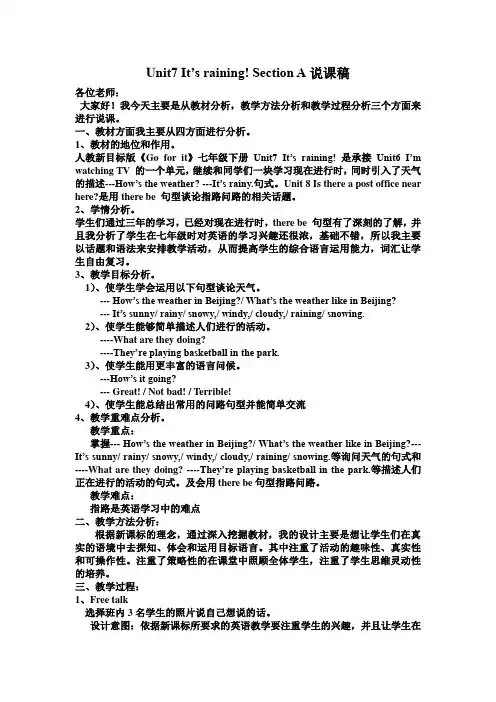
U nit7 It’s raining! Section A说课稿各位老师:大家好!我今天主要是从教材分析,教学方法分析和教学过程分析三个方面来进行说课。
一、教材方面我主要从四方面进行分析。
1、教材的地位和作用。
人教新目标版《Go for it》七年级下册Unit7 It’s raining! 是承接Unit6 I’m watching TV 的一个单元,继续和同学们一块学习现在进行时,同时引入了天气的描述---How’s the weather? ---It’s rainy.句式。
Unit 8 Is there a post office near here?是用there be 句型谈论指路问路的相关话题。
2、学情分析。
学生们通过三年的学习,已经对现在进行时,there be 句型有了深刻的了解,并且我分析了学生在七年级时对英语的学习兴趣还很浓,基础不错,所以我主要以话题和语法来安排教学活动,从而提高学生的综合语言运用能力,词汇让学生自由复习。
3、教学目标分析。
1)、使学生学会运用以下句型谈论天气。
--- How’s the weather in Beijing?/ What’s the weather like in Beijing?--- It’s sunny/ rainy/ snowy,/ windy,/ cloudy,/ raining/ snowing.2)、使学生能够简单描述人们进行的活动。
----What are they doing?----They’re playing basketball in the park.3)、使学生能用更丰富的语言问候。
---How’s it going?--- Great! / Not bad! / Terrible!4)、使学生能总结出常用的问路句型并能简单交流4、教学重难点分析。
教学重点:掌握--- How’s the weather in Beijing?/ What’s the weather like in Beijing?--- It’s sunny/ rainy/ snowy,/ windy,/ cloudy,/ raining/ snowing.等询问天气的句式和----What are they doing? ----They’re playing basketball in the park.等描述人们正在进行的活动的句式。
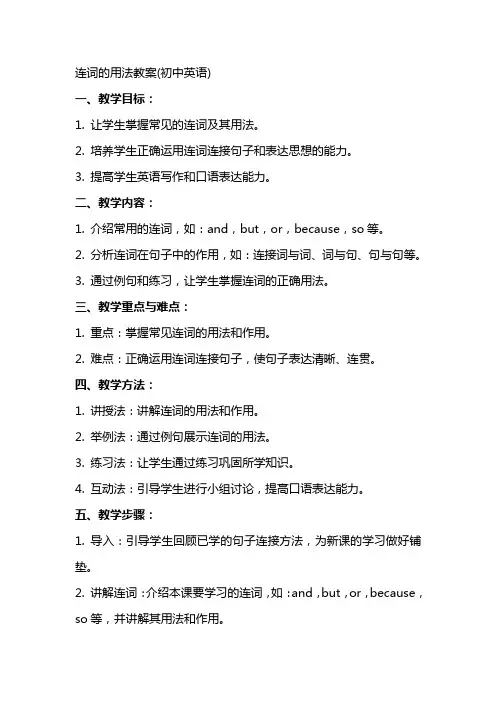
连词的用法教案(初中英语)一、教学目标:1. 让学生掌握常见的连词及其用法。
2. 培养学生正确运用连词连接句子和表达思想的能力。
3. 提高学生英语写作和口语表达能力。
二、教学内容:1. 介绍常用的连词,如:and,but,or,because,so等。
2. 分析连词在句子中的作用,如:连接词与词、词与句、句与句等。
3. 通过例句和练习,让学生掌握连词的正确用法。
三、教学重点与难点:1. 重点:掌握常见连词的用法和作用。
2. 难点:正确运用连词连接句子,使句子表达清晰、连贯。
四、教学方法:1. 讲授法:讲解连词的用法和作用。
2. 举例法:通过例句展示连词的用法。
3. 练习法:让学生通过练习巩固所学知识。
4. 互动法:引导学生进行小组讨论,提高口语表达能力。
五、教学步骤:1. 导入:引导学生回顾已学的句子连接方法,为新课的学习做好铺垫。
2. 讲解连词:介绍本课要学习的连词,如:and,but,or,because,so等,并讲解其用法和作用。
3. 示例:用所学的连词连接词或句子,展示连词的实际运用。
4. 练习:让学生通过填空、改写等形式的练习,巩固所学连词的用法。
5. 互动:分组进行讨论,让学生运用所学连词进行句子连接,培养口语表达能力。
6. 总结:对本课所学内容进行总结,强调连词在句子中的重要作用。
7. 作业:布置相关的写作或口语作业,让学生进一步巩固所学知识。
六、教学拓展:1. 介绍连词的分类:并列连词、从属连词、并列副词等。
2. 分析不同类型连词的用法和作用。
3. 通过例句和练习,让学生掌握各类连词的正确用法。
七、课堂活动:1. 举办连词用法竞赛,激发学生学习兴趣。
2. 学生分组进行竞赛,培养团队协作能力。
3. 教师点评竞赛结果,对学生的优点进行表扬,对不足之处进行指导。
八、课后作业:1. 让学生运用所学连词,完成一篇小作文。
2. 要求作文内容连贯、条理清晰,运用适当的连词。
3. 教师批改作文,对学生的写作能力进行评价,并提出改进意见。
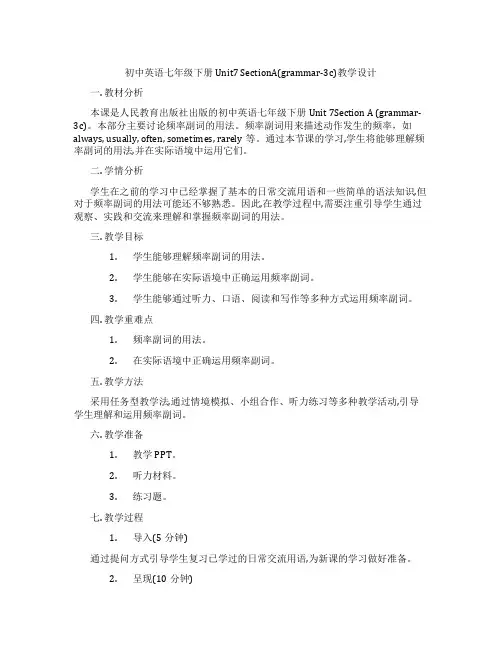
初中英语七年级下册 Unit7 SectionA(grammar-3c)教学设计一. 教材分析本课是人民教育出版社出版的初中英语七年级下册Unit 7Section A (grammar-3c)。
本部分主要讨论频率副词的用法。
频率副词用来描述动作发生的频率,如always, usually, often, sometimes, rarely等。
通过本节课的学习,学生将能够理解频率副词的用法,并在实际语境中运用它们。
二. 学情分析学生在之前的学习中已经掌握了基本的日常交流用语和一些简单的语法知识,但对于频率副词的用法可能还不够熟悉。
因此,在教学过程中,需要注重引导学生通过观察、实践和交流来理解和掌握频率副词的用法。
三. 教学目标1.学生能够理解频率副词的用法。
2.学生能够在实际语境中正确运用频率副词。
3.学生能够通过听力、口语、阅读和写作等多种方式运用频率副词。
四. 教学重难点1.频率副词的用法。
2.在实际语境中正确运用频率副词。
五. 教学方法采用任务型教学法,通过情境模拟、小组合作、听力练习等多种教学活动,引导学生理解和运用频率副词。
六. 教学准备1.教学PPT。
2.听力材料。
3.练习题。
七. 教学过程1.导入(5分钟)通过提问方式引导学生复习已学过的日常交流用语,为新课的学习做好准备。
2.呈现(10分钟)通过展示一张日历,引导学生关注日常生活中的频率副词,如每天、每周、每月等。
然后呈现本节课要学习的频率副词,如 always, usually, often, sometimes, rarely 等,让学生观察并尝试分类。
3.操练(10分钟)将学生分成小组,每组选一个频率副词,用这个副词造句,并尽可能多地使用它。
然后,各小组互相交流并展示他们的句子。
4.巩固(10分钟)让学生听一段对话或短文,并圈出其中的频率副词。
然后,让学生用自己的话复述所听内容。
5.拓展(10分钟)让学生写一篇短文,描述自己的一天的活动,并尽可能多地使用所学的频率副词。
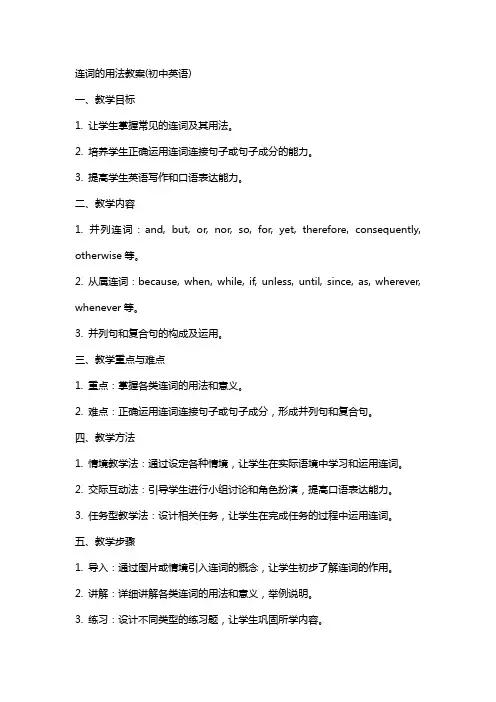
连词的用法教案(初中英语)一、教学目标1. 让学生掌握常见的连词及其用法。
2. 培养学生正确运用连词连接句子或句子成分的能力。
3. 提高学生英语写作和口语表达能力。
二、教学内容1. 并列连词:and, but, or, nor, so, for, yet, therefore, consequently, otherwise等。
2. 从属连词:because, when, while, if, unless, until, since, as, wherever, whenever等。
3. 并列句和复合句的构成及运用。
三、教学重点与难点1. 重点:掌握各类连词的用法和意义。
2. 难点:正确运用连词连接句子或句子成分,形成并列句和复合句。
四、教学方法1. 情境教学法:通过设定各种情境,让学生在实际语境中学习和运用连词。
2. 交际互动法:引导学生进行小组讨论和角色扮演,提高口语表达能力。
3. 任务型教学法:设计相关任务,让学生在完成任务的过程中运用连词。
五、教学步骤1. 导入:通过图片或情境引入连词的概念,让学生初步了解连词的作用。
2. 讲解:详细讲解各类连词的用法和意义,举例说明。
3. 练习:设计不同类型的练习题,让学生巩固所学内容。
4. 小组讨论:学生分组讨论,运用连词编写句子或短文。
5. 展示:各小组展示讨论成果,其他学生进行评价和补充。
7. 作业布置:布置相关作业,让学生进一步巩固所学知识。
六、教学拓展1. 引导学生了解连词在英语语法中的地位和作用。
2. 介绍连词的分类及其用法,如并列连词、从属连词、副词连词等。
3. 举例讲解连词在复杂句子结构中的应用,如并列句、复合句、并列复合句等。
七、课堂活动1. 开展连词接龙游戏,让学生在轻松愉快的氛围中学习连词。
2. 组织学生进行英语角活动,运用所学连词进行口语交流。
3. 举办连词用法竞赛,激发学生学习兴趣,提高运用能力。
八、教学评价1. 课堂参与度:观察学生在课堂活动中的积极参与情况和表现。
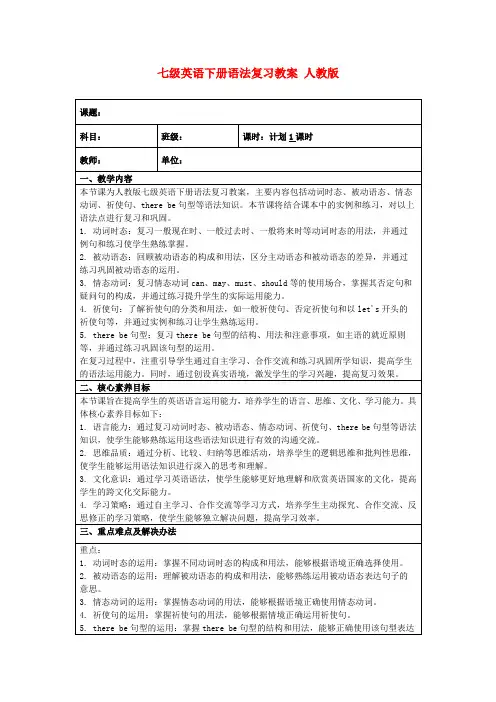
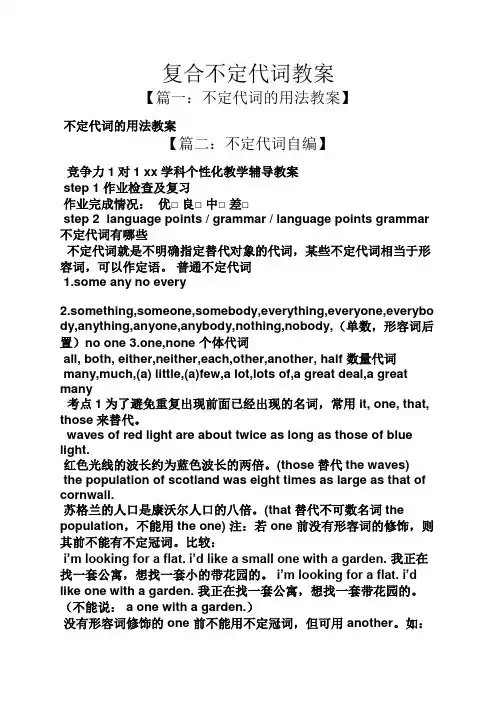
复合不定代词教案【篇一:不定代词的用法教案】不定代词的用法教案【篇二:不定代词自编】竞争力1对1 xx学科个性化教学辅导教案step 1 作业检查及复习作业完成情况:优□ 良□ 中□ 差□step 2 language points / grammar / language points grammar 不定代词有哪些不定代词就是不明确指定替代对象的代词,某些不定代词相当于形容词,可以作定语。
普通不定代词1.some any no every2.something,someone,somebody,everything,everyone,everybo dy,anything,anyone,anybody,nothing,nobody,(单数,形容词后置)no one3.one,none 个体代词all, both, either,neither,each,other,another, half 数量代词many,much,(a) little,(a)few,a lot,lots of,a great deal,a great many考点1为了避免重复出现前面已经出现的名词,常用it, one, that, those来替代。
waves of red light are about twice as long as those of blue light.红色光线的波长约为蓝色波长的两倍。
(those替代the waves)the population of scotland was eight times as large as that of cornwall.苏格兰的人口是康沃尔人口的八倍。
(that替代不可数名词the population,不能用the one) 注:若 one 前没有形容词的修饰,则其前不能有不定冠词。
比较:i’m looking for a flat. i’d like a small one with a garden. 我正在找一套公寓,想找一套小的带花园的。
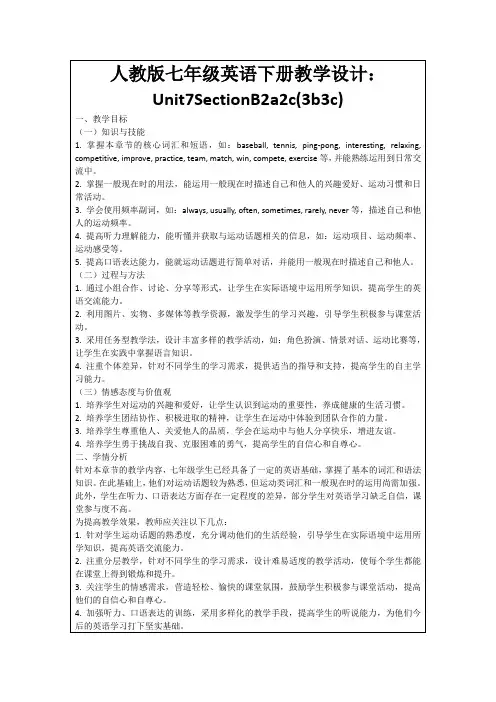
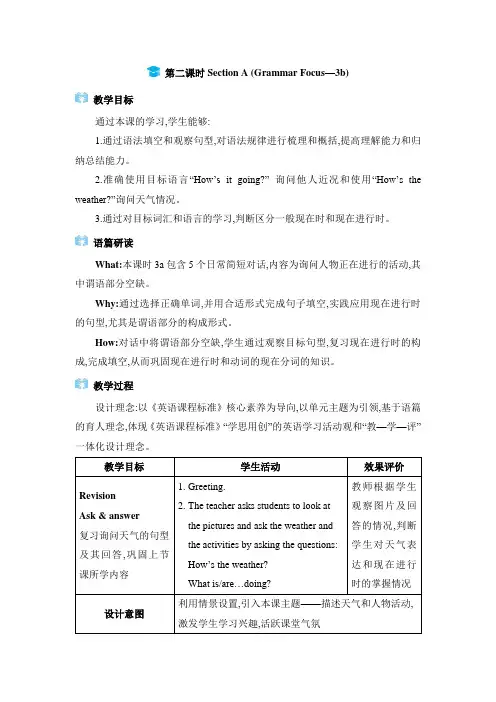
第二课时Section A (Grammar Focus—3b)
教学目标
通过本课的学习,学生能够:
1.通过语法填空和观察句型,对语法规律进行梳理和概括,提高理解能力和归纳总结能力。
2.准确使用目标语言“How’s it going?” 询问他人近况和使用“How’s the weather?”询问天气情况。
3.通过对目标词汇和语言的学习,判断区分一般现在时和现在进行时。
语篇研读
What:本课时3a包含5个日常简短对话,内容为询问人物正在进行的活动,其中谓语部分空缺。
Why:通过选择正确单词,并用合适形式完成句子填空,实践应用现在进行时的句型,尤其是谓语部分的构成形式。
How:对话中将谓语部分空缺,学生通过观察目标句型,复习现在进行时的构成,完成填空,从而巩固现在进行时和动词的现在分词的知识。
教学过程
设计理念:以《英语课程标准》核心素养为导向,以单元主题为引领,基于语篇的育人理念,体现《英语课程标准》“学思用创”的英语学习活动观和“教—学—评”一体化设计理念。
板书设计
作业设计
基础型作业:Read and recite the sentences in Grammar Focus.
实践型作业:Write down your interview report in 3c in a short passage.
拓展型作业:Imagine you are an interviewer. Today is Sunday, please interview your classmates.
教学反思。
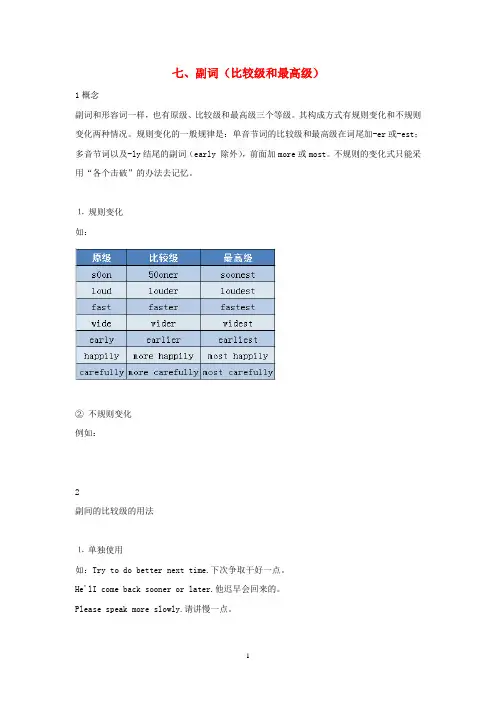
七、副词(比较级和最高级)1概念副词和形容词一样,也有原级、比较级和最高级三个等级。
其构成方式有规则变化和不规则变化两种情况。
规则变化的一般规律是:单音节词的比较级和最高级在词尾加-er或-est;多音节词以及-ly结尾的副词(early 除外),前面加more或most。
不规则的变化式只能采用“各个击破”的办法去记忆。
⒈规则变化如:②不规则变化例如:2副间的比较级的用法⒈单独使用如:Try to do better next time.下次争取干好一点。
He'lI come back sooner or later.他迟早会回来的。
Please speak more slowly.请讲慢一点。
⒉和than一起使用如:He swims better than I do.他游泳游得比我好。
Can you do any better than that.你能不能干的好一些?He arrived earlier than usual.他到的比平时早。
⒊比较级前可有状语修饰如:You must work much faster.你必须大大加快干活的速度。
Can you come over a bit more quickly?你能稍稍快点来吗?⒋ as…as和not so…as结构这两个结构也可结合副词使用① as…as可用在肯定句中,表示“像……一样",后面的副词要用原级。
如:She can run as fast as a deer.她能跑的像鹿一样快。
②在否定句中,as…as和so…as都可以用。
例如:I don’t go there as much as I use我现在到那里不象过去那么多了。
I didn't do as(so)well as I should.我做的不如我应做的那么好。
③这种句子中也可以有一个表示程度的状语。
例如:She can read twice as fast as he does.她阅读的速度比他快一倍。
宕昌县理川中学 2018 - 2019 学年第 2 学期教案第周八年级英语备课组教案教师授课时间课时5-1课题Unit 7 Section A (1a-2d)课型新授教具准备教学目标一、知识与技能:1.掌握重点单词和短语:(1) square meter deep desert population Asia feel free tour tourist wall amazing ancient protect wide.(2) the population of as far as feel free to do …as …as2.掌握重点句式:(1) The Qomolangma is 8844.43meters high.(5 meters long/20 feet wide)(2) The Sahara is about 9,600,000 square kilometers in size.(3) It’s a lot bigger than the population of the United States.(much, far, a little, much, even)(4) China has the biggest population in the world.(5) China is one of the oldest countries in the world.二、过程与方法:通过听、说、读、写等任务型活动,熟练应用词汇和句型。
三、情感态度与价值观:引导学生学会用比较级、最高级来比较描述事物感受大自然的美。
重点 1. 学会使用比较级、最高级; 2. 正确使用有关原级、比较级、最高级;难点1. 不规则形容词、副词的比较级、最高级形式,尤其是多音节形容词及副词;2. 灵活运用比较级、最高级谈论自然景观。
教学环节问题分层设置旁注教学内容复习旧课(新课预习、作业的检查)Listen and sing the song新课导入以6道知识竞答题做热身、导入。
Lesson 7复合不定代词、连词和频度副词【内容提要】复合不定代词、连词和频度副词【知识要点回硕】常见的复合不定代词Some-类someone〔某人〕,somebody〔某人〕,something〔某事物〕,somewhere〔某地〕等Any-类anyone〔任何人〕,anybody〔任何人〕,anything〔任何事物〕,anywhere〔任何地方〕等No-类no one〔没人〕,nobody〔没人〕,nothing〔没事物〕,nowhere〔没什么地方〕等Every-类everyone〔每个人〕,everybody〔每个人〕,everything〔一切事物〕,everywhere〔至U处〕等用法一般用法Some关通常用于肯定句;Any-类通常用于否认句、疑问句表请求、邀请、提建议等的疑问句中,用Some-类复合不定代词表示"一些"表杳定含义not + everything等表示的是局部否TE ,意为"并非都,不都"not + anything等和nothing等均表示全部否TE ,意为"没有"特殊用法复合不定代词通常被看成是第三人称单数,当它们作主语时,谓语动词用单数形式复合不定代词的定语〔修饰词〕必须放在复合不定代词的后面以复合不定代词作主语的祈使句,谓语动词用原形常见的频度副词always〔100%〕意为"总是,一直〞表示动作的重复,状态的持续,中间没有间断usually〔80%〕意为通常〞表示通常如此,很少例外often〔60%〕意为经常,常常"不如usually那么频繁,表示动彳3复,中间有间断sometimes〔40%〕意为宥时,不时〞表示动作偶尔发生,中间常有间断,频率比often低hardly〔10%〕具有否认意义,表7K几乎不,简直不",除非特殊情况,否那么不会发生never〔0%〕意为从来不,未曾",频度为零用法一般用法通常和一般现在时连用,表示现在、经常或反复发生的动作对usually, often, sometimes, seldom, hardly 提问时,常用how often特殊用法当always与现在进行时连用时,常译作〞老是,总是",带有贽扬、厌烦、不满等感情色彩常见的连词并列连词表并列关系and, both...and...等表转折关系but, while 等表选择关系or, either...or…等表因果关系so, for 等其他after, before 等附属连词引导时间状语从句when, while 等用法and连接两个或两个以上的单词、短语或句子.连接两个句子口」以在连词前加逗号,也可以不加连接两个并列主语时,谓语动词用复数形式both...and..可用来连接两个并列的主语、谓语、宾语、表语和状语等连接两个并列的主语时,谓语动词通常用复数形式not only...but also... 表示"不但.而且",连接主语时,强调后者,谓语动词根据后面名词的单复数而定as well as表示"也,还后","名词+as well as+名词"作主语时,强调前回的名词,谓语动词要根据前面名词的单复数而定either...or...表示〞或者...或者…〞,通常引导两个相同的语法单位,连接两个并列主语时,谓语动词的单复数遵循就近原那么because/as 表小"由于",引导原因状语从句,as语气比because弱though/although表示"虽然,即使",引导让步状语从句,可用but进行句型转换,但不能同时出现,有though/although就不能有but,反之一样【考点突破】例1 Our teacher was very happy because failed the examination.A. somebodyB. nobodyC. anybody[讲解]此题考查复合不定代词的辨析. somebody某人;nobody没人;anybody任何人;everybody母个人. 综合题干可推断我们老师很快乐的原因是由于没有人测试不及格.[答案]B例2 --- Would you like to drink?---Yes, please.A. anythingB. somethingC. nothing[讲解]此题考查复合不定代词在表示请求提建议等疑问句中的用法.在表示请求、邀请、提建议等带有委婉语气的疑问句中,用Some-类的复合不定代词表示“一些〞.[答案]B例3 CCTV-10 often plays around the world. It can help us learn more about not only nature but also different cultures and customs.A. new somethingB. something newC. anything new[讲解]此题考查复合不定代词与修饰词的位置关系.修饰复合不定代词的形容词放在其后,[答案]B例4 Do you want to stay at home go shopping with us?A. andB. butC. or[讲解]此题考查连词的根本用法.连接两个或两个以上的单词、短语或句子,表选择关系,在疑问句中用or.[答案]C【知识点拨】复合不定代词的所有格1 .含-one和-body等指人的复合不定代词,在后面加-'s表示所有格.如:anybody's seat.2 .除与-thing构成的复合不定代词外,都有所有格形式.如:everybody's idea.3 .当其后有else时,-'s 要力口在else 后面.如:somebody else's coat.例5 She is a good student, and she studies. But the problem is hard, she works it out by herself.A. hardly; hardB. hard; hardC. hard; hardly[讲解]此题考查频度副词hardly的用法.hard为副词时,表示“努力地;猛烈地〞;而hardly是副词,表示“几乎不".由第一句“她是个好学生〞可知,她学习很努力,而第二个空由“但是这道题很难〞可知, 应填hardly o [答案]C例6 I hope to visit the USA in the future.A. sometimesB. some timesC. sometime[讲解]此题考查频度副词的辨析. sometimes表示"有时";some times表示“几次,几倍"sometime表示“某一时间〞,可指将来,也可指过去;some time表示“一段时间〞.由in the future可知,此处表示未来的某一时间,填sometime o[答案]C【知识点拨】sometimes, some times, sometime 与some time 的区别sometimes意为有"时“some times意为几次,几倍〞sometime意为某一时间〞可指将来时,也可指过去时some time意为〜段时间〞记忆口诀分开是,段〞合起是某时〞分开s是倍次〞合起s是有"时〞例7把句子补充完整他通常晚上看电视.He TV in the evening.[讲解]此题考查频度副词的用法.由于watch TV是实义动词短语,usually放在watch TV 子用的是一般现在时态,主语为第三人称单数,所以watch要用第三人称单数形式.[答案]usually watches【试题研究】、单项选择(C) 1. --- Do you have to say for yourself?---No, I have to say.A. something; everythingB. nothing; something(C) 2. I ride a bike to school. But this morning, I walked to school.A. neverB. hardlyC. usually(B) 3. Everything ready. We can start now.A. areB. isC. be(A) 4. --- will you finish your homework, Kate?---In an hour.A. How longB. How oftenC. How soon(A) 5. There's with his eyes. He's OK.A. nothing wrongB. wrong somethingC. wrong nothing (C) 6. Lucy has seen the film, Lily hasn't.A. andB. orC. but ;又由于句C. anything; nothing(C) 7. --- Can you understand what I said?-Sorry, I can follow you. A. alwaysB. nearly(A) 8. --- How often do the students play sports?---They play sports . A. twice a dayB. since last night(B) 9. --- Would you please give this newly-published novel to Jack?---Certainly, he comes back.(A) 10. --- do you exercise?---Hardly ever. Because I am very busy with my work. A. How oftenB. How longC. How far(C) 11. He hardly goes to school by car, he?A. isn'tB. doesn'tC. does(B) 12. --- What do you think of your Junior Middle School life?---I think it is colorful, I am always busy. A. ifB. thoughC. while(A) 13. Rose, you are so thin. You should eat more,(A) 14. There's on the moon.A. no air but waterB. not any air or waterC. not any air and water(B) 15. I am looking for a waiter. She must be too old too young.A. both; andB. neither; norC. either; orA. beforeB. as soon asC. untilC. hardlyC. for two hoursyou'll make yourself ill.A. orB. ifC. and(C) 16.my classmatesour class teacher was there then. A. Neither; or B. Both; andC. Not only; but also【综合技能练习】二、单项选择(A) 17. --- The story is so amazing! It's the most interesting story I've ever read.---But I'm afraid it won't be liked byA. everybodyB. somebodyC. anybody(C) 18. Put it down, Richard. You mustn't read letter.A. anyone's else'sB. anyone's elseC. anyone else's(C) 19. --- Got any information about High School Examination?---Well, I was trying to, but foundA. oneB. no oneC. none(B) 20. --- Everyone is here today,---No, Han Mei isn't here. She's ill.A. isn't itB. isn't heC. isn't everyone (C) 21. --- What's in the box?---It's empty. There is in it.A. noneB. no oneC. nothing(B) 22. There was wrong with my bike, so I went to school on foot yesterday.A. anythingB. somethingC. somebody(A) 23. --- Do you know about that boy? ---Sorry, I don't know.A. anythingB. somethingC. somebody(A) 24. Mrs. Brown is nice. Every day she tried to cook for me during my stay in Canada.A. something differentB. anything differentC. different something (C) 25. --- Do you have else to say for your mistake?but sorry.A. anything; SomethingB. something; EverythingC. anything; Nothing(B) 26. --- It is raining hard, the farmers are still working in the field.---So they are.A. andB. butC. so(A) 27. She still failed in the exam, she tried her best.A. thoughB. becauseC. if(B) 28. --- I hear Tom is leaving. --- why?A. AndB. ButC. Or(B) 29. --- What shall we do now?--- it's raining hard, let's stay at home.A. SoB. SinceC. Though(C) 30. --- Do you know about Florence Nightingale?---Yes, she was well-known as a nurse in England her kindness to the sick and wounded soldiers.A. asB. ofC. for(C) 31. Practice more, you'll learn English better.A. orB. soC. and(A) 32. I think you should complain, of course, , you are happy with the situation.A. unlessB. howeverC. until(B) 33. You'd better not read today's newspaper because there is in it.A. nothing specialB. anything newC. something interesting (C) 34. --- Your tea, please.---There must be in the tea. I like this kind of tea with sugar.A. nothing sweetB. something sweetC. sweet something (D) 35. --- What's the secret of success, Dad?---More time and effort, you'll makeA. orB. becauseC. and三、首字母填空.根据句意及首字母提示,完成单词.1. Tom leaves his schoolbag at home, so mom asks me to take it to him.2. This small house is warm ____ enough for this little dog to live in in the cold winter.3. I still have many problems ____ with my English, so I should study harder.4. His mother left him without giving him a piece of message _____ . He misses her a lot.5. After working for a long time, he sits ____ on the chair to have a rest.6. People can't have much water to drink because it's too dry _____ in this country.7. It's bad time to swim, because the water is too cold.8. After a heavy snow, lots of people are skating _____ on the ice and having fun.9. These dishes are not clean. Let's wash them before having dinner.10. You can't talk with your friends in the library, but you can talk outside ______四、完成对话.在对话的空格中填上适当的单词,使对话完整正确.一空一词〔含缩写词〕.A: Hello, Dave. How's it going? What are you doing?B: Hi, Jack. I am 1 a movie with my friend. But the movie is really 2 . I don't like it at all.A: Why not join us and play 3 together? I want to play it very much these days.B: 4 great! But I don't have basketball. Do you have one?A: Of course. I 5 it with me today.B: Great! By the way, 6 is the weather outside? Is it hot?A: Very good. It's 7 but it's not hot.B: OK. Let's invite〔邀请〕Bob to play with us together. I haven't seen him for a long 8 .A: Well, I'm sorry to tell you that he 9 to go to the math class.B: It doesn't matter. He can play with us 10 time.A: Yes, we can also invite other friends to join us.1.watching2.boring3.basketball4.Sounds5.take6.how7.sunny8.time9.has 10.nextany because children fight free have life like many meet talk theyWho is the most important people in your life? Many teenagers〔青少年〕feel that the most important people in their 1 are their friends. They think their parents don't know them as 2 as their friends do. In large families, it is quite often for brothers and sisters 3 with each other. And then they can only go to 4 friends for advice.It is very important for teenagers 5 a good friend or a group of friends. Even when they are not with their friends, they usually spend time 6 with them on the phone. The communication〔交流〕is very important in 7 growing up, and friends can discuss〔讨论〕something freely. However, parents often try tochoose 〔选择〕8 friends for them. Some parents stop their children from 9 their good friends. A truefriend is 10 a good book. A true friend plays an important role in children's life.1.lives2.much3.to fight4.their5.to have6.talking7.children's8.some9.meeting 10.like六、补全短文.根据短文内容,从短文后的选项中选出适当的选项补全短文.Dear Mary,Thanks a lot for your letter and the great photos. I like them very much. Here are some of my photos. 1 In the second one, I am playing football on the playground in our school. In the third one, you can see my family at home. 2 In the last one, I am with my little sister Beth. She's watching TV and I am doing my homework.3 It rains all day and we all feel cold. How's the weather in Fuzhou? Is it sunny or windy? I love the weather thereand I want to go to Fuzhou again. The holiday is coming soon. 4 Do you want to come to Chengdu?5 I am looking forward to your reply.Best wishes to you and your family.A. In the first one, I am swimming in the lake.B. We're having dinner together.C. What's your plan for it?D. I am a student in No.7 Middle School.E. Please write to me soon.F. The weather is bad today.1.A2.B3.F4.C5.E********** 循序渐进练写作,辞别“挤牙膏〞的痛苦********** 【心理衔接】很多同学听到“英语作文〞,就会不由自主地想起“挤牙膏〞般拼凑单词的痛苦.然而,想要提升英语作文的分数,没有什么捷径可走,唯有勤练写作.提升写作水平不能妄想一步登天,但可以根据下面由易到难,循序渐进的方法来练习.一、仿写.即仿照有关内容写一篇类似的短文. 比方阅读某篇描写小狗的文章时 ,我们可以参照写一篇描写小猫或小鸡的短文.二、改写.可以将某篇对话改写成短文,也可以用英语概括出课文的主要情节.三、扩写.即对某个英语句子或题材进行数次扩展、补充,从而完成短文的写作.。
连词的用法教案(初中英语)第一章:引言教学目标:1. 让学生了解连词的定义和作用。
2. 引导学生区分不同类型的连词。
教学内容:1. 连词的定义和作用。
2. 并列连词、从属连词和副词连词的区别。
教学步骤:1. 引入连词的概念,让学生思考在日常生活中遇到的连词例子。
2. 解释连词的作用,如连接词与词、短语与短语、句子与句子等。
3. 介绍并列连词、从属连词和副词连词的定义和特点。
4. 通过例句展示各种连词的用法。
5. 进行课堂练习,让学生区分和运用不同类型的连词。
第二章:并列连词教学目标:1. 让学生掌握并列连词的用法。
2. 培养学生正确运用并列连词的能力。
教学内容:1. 并列连词的定义和作用。
2. 常用的并列连词及其用法。
教学步骤:1. 复习并列连词的概念。
2. 介绍常用的并列连词,如and、or、but、so等。
3. 通过例句展示并列连词的用法。
4. 进行课堂练习,让学生运用并列连词连接句子或短语。
第三章:从属连词教学目标:1. 让学生理解从属连词的概念。
2. 培养学生正确运用从属连词的能力。
教学内容:1. 从属连词的定义和作用。
2. 常用的从属连词及其用法。
教学步骤:1. 引入从属连词的概念,让学生思考在日常生活中遇到的从属连词例子。
2. 解释从属连词的作用,如连接主从句、引导条件句、引导结果句等。
3. 介绍常用的从属连词,如if、because、although、when等。
4. 通过例句展示从属连词的用法。
5. 进行课堂练习,让学生运用从属连词构建句子。
第四章:副词连词教学目标:1. 让学生了解副词连词的概念。
2. 培养学生正确运用副词连词的能力。
教学内容:1. 副词连词的定义和作用。
2. 常用的副词连词及其用法。
教学步骤:1. 引入副词连词的概念,让学生思考在日常生活中遇到的副词连词例子。
2. 解释副词连词的作用,如连接并列句、引导状语从句等。
3. 介绍常用的副词连词,如for、in order to、so that等。
04 复合不定代词和频度副词【基础知识】一、复合不定代词不指明代替任何特定名词或形容词的代词叫做不定代词。
主要出现的不定代词为由some,any,no,every构成的复合不定代词,在这些复合不定代词中,除no one以外,其他都要写成一个词。
1. 复合不定代词有:物something 某物anything 任何事物nothing 无物everything 每一件事人somebody someone某人anybody anyone任何人nobody no one没有人everybody everyone每人【注意】由some, any, no, every构成的复合不定代词作主语时,谓语动词用第三人称单数形式。
其中some-用于肯定句,any-用于否定句和疑问,但是当表示请求等用some-,如Would you like something to eat?你想要吃些什么吗?2. 复合不定代词的定语(1)形容词修饰不定代词或不定副词时,要位于不定代词或不定副词之后,作后置定语。
There are something beautiful in the park.公园里有一些漂亮的事物。
Many people like to go somewhere interesting to have a vacation. 许多人喜欢去有趣的地方度假。
(2)复合不定代词与动词不定式连用,不定式作后置定语。
Haven’t you got anything to do? 你无事可干吗?【典例】—Tom, please come here. I have _____ to tell you. —OK. I’m coming.A. anything importantB. important somethingC. something important3. 复合不定代词的属格1)含-one和-body等指人的复合代词可有-’s属格形式。
第三课时Section B(1a—1e)教学目标通过本课的学习,学生能够:1.获取和梳理本课时听力和对话语篇中的what、how、why关键信息;理解并掌握本课时重点词汇、句型,谈论天气状况和询问、回答人物近况。
2.运用相关的语言表达,分角色表演对话,提高特定情境下的交际能力。
3.通过小组合作,以短文形式复述Mary和Eric的经历,重点是关于天气、活动的描写,并在全班面前展示。
语篇研读What:本课时听力语篇讲述了Mary和Eric打电话询问近况,谈论彼此所在城市的天气及正在进行的活动。
对天气的描写增加了人物对气候的身体感受。
Why:通过学习听力对话材料,学生能够在日常交际中互致问候、谈论天气、询问正在进行的活动。
How:语篇采用听力对话形式呈现,展示了打电话交际的完整过程,重点呈现询问天气的基本句型和现在进行时表达正在进行的活动。
开头简单介绍打电话的原因,进而询问近况、正在做什么,谈论天气等。
教学过程设计理念:以《英语课程标准》核心素养为导向,以单元主题为引领,基于语篇的育人理念,体现《英语课程标准》“学思用创”的英语学习活动观和“教—学—评”一体化设计理念。
教学目标学生活动效果评价Lead-in通过观看视频,学生能够感知可以通过人物感受描述天气1.Greeting.2.Play a video and lead students tothink:How can we describe theweather?New words:dry,cold,hot,warm,cool教师观察学生观看视频的表现,根据学生的表现预判学生对天气词汇和句型的了解情况教学目标学生活动效果评价设计意图利用视频,引出本课时新词,在观看的过程中自然感知目标语言,激发学生学习兴趣【学习理解】Activity1: Revision复习询问天气的句型及其回答,巩固所学内容1.Look at the map of China and theweather icons.2.Answer the questions:How’s theweather in…?(Choose a city.)教师观察学生回答问题的表现,并根据学生的回答判断学生对目标语言的掌握情况设计意图通过图片引导学生复习单词和句型,寓教于乐。
一、教学目标:1. 让学生掌握常用的语法连词,包括并列连词和从属连词。
2. 培养学生正确使用语法连词的能力,使句子表达更加准确和流畅。
3. 提高学生的英语语法水平和写作能力。
二、教学内容:1. 并列连词:and, but, or, nor, so, for, yet, therefore, consequently, otherwise, additionally等。
2. 从属连词:because, although, even though, if, unless, when, whenever, until, while, wherever, whichever, that等。
三、教学方法:1. 采用任务型教学法,让学生在实际语境中运用语法连词。
2. 利用多媒体教学资源,如PPT、视频等,增加课堂趣味性。
3. 组织小组讨论和互动,提高学生的参与度和合作能力。
四、教学步骤:1. 引入:通过一个简单的句子,引导学生注意语法连词的重要性。
2. 讲解:讲解并列连词和从属连词的用法和区别。
3. 练习:设计不同类型的练习题,让学生巩固所学知识。
4. 应用:分组讨论,让学生在实际语境中运用语法连词。
5. 总结:对本节课的内容进行总结,强调重点和难点。
五、课后作业:1. 抄写本节课所学的并列连词和从属连词。
2. 完成课后练习题,巩固所学知识。
3. 结合所学内容,写一篇小短文,尽量使用所学的语法连词。
六、教学评估:1. 课堂参与度:观察学生在课堂上的参与情况,包括回答问题、小组讨论等。
2. 练习题的正确率:检查学生完成练习题的正确率,以评估学生对语法连词的掌握程度。
3. 课后作业:评估学生完成课后作业的质量,包括语法连词的使用和短文的逻辑性。
七、教学资源:1. PPT:制作精美的PPT,展示语法连词的用法和例句。
2. 练习题:准备不同难度的练习题,巩固学生的知识点。
3. 视频材料:选取适合的英语视频材料,提供真实语境,帮助学生更好地理解语法连词的使用。
Lesson 7复合不定代词、连词和频度副词【内容提要】复合不定代词、连词和频度副词【知识要点回硕】1. 常见的复合不定代词及其用法2. 常见的频度副词及其用法3. 常见的连词及其用法【考点突破】例1 Our teacher was very happy because failed the examination.A. somebodyB. nobodyC. anybody[讲解] 本题考查复合不定代词的辨析。
somebody 某人;nobody没人;anybody任何人; everybody母个人。
综合题干可推断我们老师很高兴的原因是因为没有人考试不及格。
[答案] B例2 --- Would you like to drink?--- Yes, please.A. anythingB. somethingC. nothing[讲解] 本题考查复合不定代词在表示请求提建议等疑问句中的用法。
在表示请求、邀请、提建议等带有委婉语气的疑问句中,用Some-类的复合不定代词表示“一些”。
[答案] B例3 CCTV-10 often plays around the world. It can help us learn more about not only nature but also different cultures and customs.A. new somethingB. something newC. anything new[讲解] 本题考查复合不定代词与修饰词的位置关系。
修饰复合不定代词的形容词放在其后,[答案] B例4 Do you want to stay at home go shopping with us?A. andB. butC. or[讲解] 本题考查连词的基本用法。
连接两个或两个以上的单词、短语或句子,表选择关系,在疑问句中用or。
[答案] C【知识点拨】复合不定代词的所有格1.含-one和-body等指人的复合不定代词,在后面加-'s表示所有格。
如: anybody's seat.2.除与-thing构成的复合不定代词外,都有所有格形式。
如: everybody's idea。
3.当其后有else时,-'s要加在else 后面。
如: somebody else's coat.例5 She is a good student, and she studies . But the problem is hard, she works it out by herself.A. hardly; hardB. hard; hardC. hard; hardly[讲解] 本题考查频度副词hardly的用法。
hard为副词时,表示“努力地;猛烈地”;而hardly是副词,表示“几乎不”。
由第一句“她是个好学生”可知,她学习很努力,而第二个空由“但是这道题很难”可知,应填hardly。
[答案] C例6 I hope to visit the USA in the future.A. sometimesB. some timesC. sometime[讲解] 本题考查频度副词的辨析。
sometimes表示“有时”;some times表示“几次, 几倍”sometime 表示“某一时间”,可指将来,也可指过去; some time表示“一段时间”。
由in the future可知,此处表示未来的某一时间,填sometime。
[答案] C【知识点拨】sometimes, some times, sometime 与some time 的区别sometimes 意为“有时”some times 意为“几次,几倍”sometime 意为“某一时间”,可指将来时,也可指过去时some time 意为“一段时间”记忆口诀分开是“一段”,合起是“某时”;分开s是“倍次”,合起s是“有时”例7 把句子补充完整他通常晚上看电视。
He TV in the evening.[讲解] 本题考查频度副词的用法。
由于watch TV是实义动词短语,usually放在watch TV前;又因为句子用的是一般现在时态,主语为第三人称单数,所以watch要用第三人称单数形式。
[答案] usually watches【试题研究】一、单项选择(C) 1. --- Do you have to say for yourself?--- No, I have to say.A. something; everythingB. nothing; somethingC. anything; nothing(C) 2. I ride a bike to school. But this morning, I walked to school.A. neverB. hardlyC. usually(B) 3. Everything ready. We can start now.A. areB. isC. be(A) 4. --- will you finish your homework, Kate?--- In an hour.A. How longB. How oftenC. How soon(A) 5. There's with his eyes. He's OK.A. nothing wrongB. wrong somethingC. wrong nothing(C) 6. Lucy has seen the film, Lily hasn't.A. andB. orC. but(C) 7. --- Can you understand what I said?-Sorry, I can follow you.A. alwaysB. nearlyC. hardly(A) 8. --- How often do the students play sports?--- They play sports .A. twice a dayB. since last nightC. for two hours(B) 9. --- Would you please give this newly-published novel to Jack?--- Certainly, he comes back.A. beforeB. as soon asC. until(A) 10. --- do you exercise?--- Hardly ever. Because I am very busy with my work.A. How oftenB. How longC. How far(C) 11. He hardly goes to school by car, he?A. isn'tB. doesn'tC. does(B) 12. --- What do you think of your Junior Middle School life?--- I think it is colorful, I am always busy.A. ifB. thoughC. while(A) 13. Rose, you are so thin. You should eat more, you'll make yourself ill.A. orB. ifC. and(A) 14. There's on the moon.A. no air but waterB. not any air or waterC. not any air and water(B) 15. I am looking for a waiter. She must be too old too young.A. both; andB. neither; norC. either; or(C) 16. my classmates our class teacher was there then.A. Neither; orB. Both; andC. Not only; but also【综合技能训练】二、单项选择(A) 17. --- The story is so amazing! It's the most interesting story I've ever read.--- But I'm afraid it won't be liked by .A. everybodyB. somebodyC. anybody(C) 18. Put it down, Richard. You mustn't read letter.A. anyone's else'sB. anyone's elseC. anyone else's(C) 19. --- Got any information about High School Examination?--- Well, I was trying to, but found .A. oneB. no oneC. none(B) 20. --- Everyone is here today, ?--- No, Han Mei isn't here. She's ill.A. isn't itB. isn't heC. isn’t everyone (C) 21. --- What's in the box?--- It's empty. There is in it.A. noneB. no oneC. nothing(B) 22. There was wrong with my bike, so I went to school on foot yesterday.A. anythingB. somethingC. somebody(A) 23. --- Do you know about that boy? --- Sorry, I don't know.A. anythingB. somethingC. somebody(A) 24. Mrs. Brown is nice. Every day she tried to cook for me during my stay in Canada.A. something differentB. anything differentC. different something (C) 25. --- Do you have else to say for your mistake?--- but sorry.A. anything; SomethingB. something; EverythingC. anything; Nothing(B) 26. --- It is raining hard, the farmers are still working in the field.--- So they are.A. andB. butC. so(A) 27. She still failed in the exam, she tried her best.A. thoughB. becauseC. if(B) 28. --- I hear Tom is leaving. --- why?A. AndB. ButC. Or(B) 29. --- What shall we do now?--- it's raining hard, let's stay at home.A. SoB. SinceC. Though(C) 30. --- Do you know about Florence Nightingale?--- Yes, she was well-known as a nurse in England her kindness to the sick and wounded soldiers.A. asB. ofC. for(C) 31. Practice more, you'll learn English better.A. orB. soC. and(A) 32. I think you should complain, of course, , you are happy with the situation.A. unlessB. howeverC. until(A) 33. You'd better not read today's newspaper because there is in it.A. nothing specialB. anything newC. something interesting(B) 34. --- Your tea, please.--- There must be in the tea. I like this kind of tea with sugar.A. nothing sweetB. something sweetC. sweet something(C) 35. --- What's the secret of success, Dad?--- More time and effort, you'll makeA. orB. becauseC. and三、首字母填空。